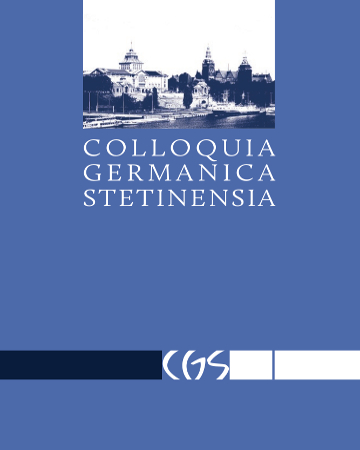







| Authors: |
Jolanta
Mazurkiewicz-Sokołowska
Uniwersytet Szczeciński |
| Keywords: | centrality matrix of domains domains conceptualizations |
| Data publikacji całości: | 2015 |
| Page range: | 15 (209-223) |
| Downloads ?: | 523 |
| 1. | ADAM, Rudolf (1981): Das Selbst und die Glücksgefühle. In: Zeitschrift für Psychosomatische Medizin 27, S. 301–306. |
| 2. | ARGYLE, Michael (1987): The psychology of happiness. London. |
| 3. | CAMERON, Paul (1975): Mood as indicant of happiness: Age, sex, social class, and situational differences. In: Journal of Gerontology 30, S. 216–224. |
| 4. | CSIKSZENTMIHALYI, Mihaly (1992): Flow. Das Geheimnis des Glücks. Stuttgart. |
| 5. | DAMASIO, Antonio (2005, 72013): Der Spinoza-Effekt. Wie Gefühle unser Leben bestimmen. Berlin. |
| 6. | FAUCONNIER, Gilles (1985): Mental spaces. Aspects of Meaning Construction in Natural Languages. Cambridge. |
| 7. | FAUCONNIER, Gilles (1997): Mappings in Thoughts and Language. Cambridge. |
| 8. | FROMM, Erich (1947): Man for himself. An inquiry into the psychology of ethics. New York. |
| 9. | LANGACKER, Ronald (1987): Foundations of cognitive grammar. Stanford. |
| 10. | LANGACKER, Ronald (2009): Gramatyka kognitywna. Kraków. |
| 11. | LAYARD, Richard (2005): Die glückliche Gesellschaft. Kurswechsel für Politik und Wirtschaft. Frankfurt a. M. |
| 12. | LAZARUS, Richard S. (1991): Emotion und adaption. New York. |
| 13. | MAYRING, Philipp (2007): Glück – Wohlbefinden – Lebensqualität. Sozialwissenschaftliche und psychologische Konzepte. In: T. Hoyer (Hg.): Vom Glück und glücklichen Leben: sozial- und geisteswissenschaftliche Zugänge. Göttingen, S. 185–199. |
| 14. | MAZURKIEWICZ-SOKOŁOWSKA, Jolanta (2014): Zur Rolle der Konzeptualisierung in Sprachverarbeitungsprozessen am Beispiel des ZEIT-Konzeptes. In: J. Mazurkiewicz-Sokołowska, A. Sulikowska, W. Westphal (Hg.): Konzeptualisierung, Sprache und Diskurs. Hamburg, S |
| 15. | MCDOUGALL, William (1908/1960): An introduction to social psychology. London. |
| 16. | PARDUCCI, Allen (1995): Happiness, pleasure and judgement: contextual theory and its applications. Mahwah. |
| 17. | TATARKIEWICZ, Władysław (1962, 1985): O szczęściu. Warszawa. |
| 18. | TUNNER, Wolfgang (1978): Lust und Glück. Überlegungen zur Gefühlspsychologie. In: Psychologische Rundschau 29, S. 287–298. |
| 19. | ZIEM Alexander (2008): Gramatyka kognitywna. Kraków. |